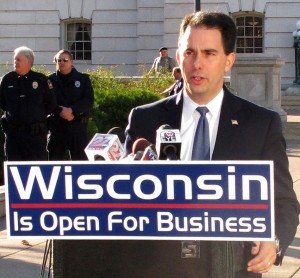
The National Journal has the most amazing piece on Scott Walker, whose name ten days ago was completely unknown. Thanks to the incredible wrong-footed bumbling of the Indonesian Imbecile, Walker is now seen as the hero of the common man versus the greedy union thugs and their DNC henchmen.
A head-on collision with the labor movement has turned the rookie Republican governor of a Midwestern state into an overnight superstar.
Barely a month after his inauguration, Wisconsin Gov. Scott Walker already has prospective presidential candidates stampeding to help him. In today's turbocharged political climate, fueled by constant chatter on cable television and the Internet, can talk of a vice presidential bid be far behind for the man who two months ago was a little-known county executive?
“If you had suggested that about Scott Walker 10 days [ago] it would have seemed incomprehensible,’’ Byron Shafer, political science professor at the University of Wisconsin-Madison, told National Journal. “Stay tuned and ask me again in another 10 days."
Walker was the lead guest on Fox News Sunday; on Monday, MSNBC boasted of a “cable exclusive’’ with him. He's become one of the most sought-after politicians in the country ever since his plan to balance Wisconsin's budget by slashing labor costs sparked days of protests by tens of thousands of union workers in the state capitol.
Likely presidential candidates from Rick Santorum to Tim Pawlenty to Mitt Romney have clamored to offer support. Organized labor is a favorite target of the right, making Walker's fight a popular rallying point. Not to mention that budget balancing has become sacred political ground for the Republican Party.
Enhancing Walker's potential as a kingmaker: His state's potentially pivotal role in 2012. Wisconsin hasn’t voted for a Republican presidential candidate since Ronald Reagan in 1984, but close elections in 2000 and 2004 have made it a battleground state.
Walker has an opportunity to capitalize on his new national platform at the National Governors Association’s upcoming annual winter meeting, which starts Saturday in Washington. Walker’s staff, which has been fielding about 80 requests a day from the national media, said he has not decided yet whether to attend.
“He’s made it pretty clear that he’s focused on balancing the budget, and that’s all,’’ said spokesman Cullen Werwie.
Shafer said it’s too soon to know how Walker will stack up next to New Jersey Gov. Chris Christie, who was elected in 2009 and whose own bold austerity moves had made him the hottest Republican governor on the national stage -- at least until last week. Nor is it easy to predict the long-term career implications of the painful cuts both governors say they have to make.
The fight isn't over but the flailing of the lamestream morons on MSLSD and CNN demonstrates that they don't know how to deal with polls that jibe with his tough stance on unions.
Walker is the man of the hour and if he can start an avalanche of decertifying greedy union thugs, he'll have a national future.
UPDATE Here is serial wuss David Brooks exhalation on the NYT Op-Ed page, one of his usual anodyne bromide-ridden specimens of silliness where after destroying the Wis Dems behavior, he kisses the hem of Punch Sulzberger's robe. But there are two good paragraphs in his kowtowing to the Left:
Even if you acknowledge the importance of unions in representing middle-class interests, there are strong arguments on Walker’s side. In Wisconsin and elsewhere, state-union relations are structurally out of whack.
That’s because public sector unions and private sector unions are very different creatures. Private sector unions push against the interests of shareholders and management; public sector unions push against the interests of taxpayers. Private sector union members know that their employers could go out of business, so they have an incentive to mitigate their demands; public sector union members work for state monopolies and have no such interest.
Private sector unions confront managers who have an incentive to push back against their demands. Public sector unions face managers who have an incentive to give into them for the sake of their own survival. Most important, public sector unions help choose those they negotiate with. Through gigantic campaign contributions and overall clout, they have enormous influence over who gets elected to bargain with them, especially in state and local races.
As a result of these imbalanced incentive structures, states with public sector unions tend to run into fiscal crises. They tend to have workplaces where personnel decisions are made on the basis of seniority, not merit. There is little relationship between excellence and reward, which leads to resentment among taxpayers who don’t have that luxury.
I actually see the public service unions, as opposed to public safety unions, as enemies of the middle class. And FDR was clear-sighted enough to spot the flaw in giving public employees the right to bargain collectively.
Scott Walker for President...!



No comments :
Post a Comment